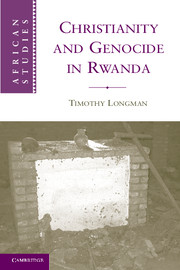Book contents
- Frontmatter
- Contents
- Acknowledgments
- Christianity and Genocide in Rwanda
- INTRODUCTION
- PART I “RIVER OF BLOOD”: RWANDA'S NATIONAL CHURCHES AND THE 1994 GENOCIDE
- 2 “Render Unto Caesar and Musinga …”: Christianity and the Colonial State
- 3 The Churches and the Politics of Ethnicity
- 4 “Working Hand in Hand”: Christian Churches and the Postcolonial State (1962–1990)
- 5 “Giants with Feet of Clay”: Christian Churches and Democratization (1990–1992)
- 6 “It Is the End of the World”: Christian Churches and Genocide (1993–1994)
- PART II “GOD HAS HIDDEN HIS FACE”: LOCAL CHURCHES AND THE EXERCISE OF POWER IN RWANDA
- CONCLUSION
- Bibliography
- Index
- Titles in the series
3 - The Churches and the Politics of Ethnicity
Published online by Cambridge University Press: 03 May 2010
- Frontmatter
- Contents
- Acknowledgments
- Christianity and Genocide in Rwanda
- INTRODUCTION
- PART I “RIVER OF BLOOD”: RWANDA'S NATIONAL CHURCHES AND THE 1994 GENOCIDE
- 2 “Render Unto Caesar and Musinga …”: Christianity and the Colonial State
- 3 The Churches and the Politics of Ethnicity
- 4 “Working Hand in Hand”: Christian Churches and the Postcolonial State (1962–1990)
- 5 “Giants with Feet of Clay”: Christian Churches and Democratization (1990–1992)
- 6 “It Is the End of the World”: Christian Churches and Genocide (1993–1994)
- PART II “GOD HAS HIDDEN HIS FACE”: LOCAL CHURCHES AND THE EXERCISE OF POWER IN RWANDA
- CONCLUSION
- Bibliography
- Index
- Titles in the series
Summary
Over the course of the six decades of colonial rule in Rwanda, the attitudes of the White Fathers and other missionaries toward Rwanda's ethnic groups shifted, but their belief in the centrality of ethnicity to social and political relations in the country never wavered. The White Fathers sought as a fundamental goal of their mission to build an alliance between the Catholic Church and the dominant political class in society, and they understood political power in Rwanda in primarily ethnic terms, ignoring or downplaying important divisions of class, region, lineage, clan, and political faction. Working together with the colonial administration and the indigenous elite, the missionaries helped to make this interpretation reality, so that by the end of the colonial period, the division among Hutu, Tutsi, and Twa had indeed become the predominant cleavage in Rwandan society.
In this chapter, I analyze the change in the Catholic missionaries' sympathies from a belief in the superiority and natural dominance of the Tutsi to a commiseration with the Hutu and support for their political rights. Although this shift had a profound impact on Rwandan society, helping to make possible the rise to power of the Hutu majority, it did not mark a major shift in the engagement of the Catholic Church in Rwanda. The church continued to support the centrality of ethnicity to Rwandan politics, and individuals within the church continued to use their political power to influence the selection of political leaders.
- Type
- Chapter
- Information
- Christianity and Genocide in Rwanda , pp. 58 - 81Publisher: Cambridge University PressPrint publication year: 2009



